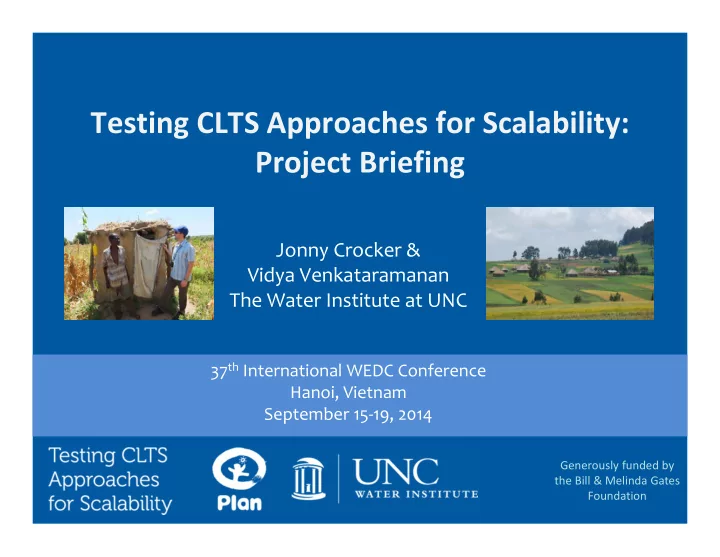

Testing CLTS Approaches for Scalability: Project Briefing Jonny Crocker & Vidya Venkataramanan The Water Institute at UNC 37 th International WEDC Conference Hanoi, Vietnam September 15 ‐ 19, 2014 Generously funded by the Bill & Melinda Gates Foundation
Outline 1. Project introduction 2. Project activities 3. Our philosophy: relevancy and rigor 4. Preliminary findings
Testing CLTS Approaches for Scalability Objective: Evaluate the potential for scale up of CLTS by engaging local actors Partners: Plan International, The Water Institute at UNC Funder: Bill & Melinda Gates Foundation Duration: October 2011 – September 2015 Setting: 10 countries
Timeline Year 1 Project startup Years 2 and 3 Implementation Data collection Year 4 Analysis Dissemination
CLTS implementation – actors involved Community Triggering Natural NGOs Demand Leader Open Latrines Construction Facilitators Defecation Management Free Households Government
Project activities Contribution Project Activities • • Global literature Understand existing Broad Context evidence review • • 7 case ‐ studies Broaden scope to additional settings • 3 situational • Understand context in assessments focus countries • 3 project • Detailed evaluation of evaluations High Detail CLTS actors
Three project evaluations Ghana Ghana Evaluate the impact of building Natural Leaders’ capacity on CLTS costs and outcomes Et Ethiopia Evaluate the impact of Teachers as facilitators on CLTS costs and outcomes Ke Kenya nya Assess the influence of training district government in CLTS program management
NEPAL Seven CLTS case studies CAMBODIA LAO PDR • In ‐ depth interviews w/ government, NGOs, and communities at national INDONESIA and local levels • Three research questions: – What are the roles of local actors in UGANDA CLTS implementation? NIGER – What enabling factors have led to successful scaling of CLTS? – What constraining factors have prevented successful scaling of CLTS? HAITI
Relevancy and rigor 1. Designing our project 2. Building mutual understanding 3. Revisiting our assumptions and research questions
Designing our project • What is the main barrier to CLTS reaching scale? • How can we address this barrier? • What is the most rigorous research design that fits?
Sample findings: Literature review • 1000+ records identified as relevant, 133 met criteria for full review Peer ‐ reviewed literature Grey Literature Focus on impact of interventions through Focus on processes and implementation mixed methods Disconnect between study design and More extensive than peer ‐ reviewed literature, conclusions with less rigorous methods Natural leaders, teachers, local government staff identified as change agents Generally, CLTS case studies of successful projects Generally, CLTS case studies of successful projects but no rigorous evidence of their impact on CLTS • Grey literature review released December 2013; full literature review now being refreshed for 2015
Sample findings: Situational assessments Institutional arrangements for CLTS in Ghana Monitoring GHANA International and local NGOs, environmental health officers and assistants, natural leaders Training Triggering Follow ‐ up Verification Certification facilitators District International Local NGOs, Local NGOs, International verification team and local NGOs environmental environmental NGOs, bi‐ and health officers health multilaterals and assistants, assistants, natural leaders natural leaders Financing Ministry of Finance, International NGOs, bi‐ and multilaterals
Sample findings: Learning Series • Who is involved: triggering
Sample findings: Project evaluations Time spent on facilitation in communities in Ghana (by region) End of contract 600 push Natural Central 500 Leader Upper West Total person ‐ hours engagement 400 Volta Rainy 300 season Triggering 200 100 0 1 2 3 4 5 6 7 8 9 10 11 12 Program Month
Testing CLTS Approaches for Scalability Plan International and the Water Institute at UNC Generously funded by the Bill & Melinda Gates Foundation • Nepal Case Studies: Project Evaluations: • Haiti • Lao PDR • Ghana • Niger • Cambodia • Kenya Literature Review: • Uganda • Indonesia • Ethiopia • Global
Visit our project website! News – Research – Tools email: clts@unc.edu web: waterinstitute.unc.edu/clts
Acknowledgements • The Water Institute at UNC • Plan International in USA • Plan International in Ethiopia, Ghana, Kenya • Plan International in Cambodia, Haiti, Indonesia, Lao PDR, Nepal, Niger, Uganda • Bill & Melinda Gates Foundation • Photos by Jonny Crocker except where otherwise noted. Unless otherwise specified, the information or findings shared in this document are a result of a sub- agreement to the University of North Carolina at Chapel Hill from Plan International USA, which was a recipient of a grant from the Bill & Melinda Gates Foundation.
Recommend
More recommend